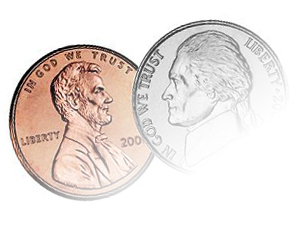Disappearing Currency?
Since 1982, when penny composition was shifted to a mix of 97.5% zinc and 2.5% copper, the mixture of metals that goes into pennies and nickels has remained steady. Believe it or not, the U.S. Treasury today spends ¢2.4 for every penny, and ¢11.2 for every nickel that it produces.
In 2011, the U.S. Treasury produced 4.3 billion pennies and 914 million nickels. For you non-math majors, that means we lost over $116 million just to produce pennies and nickels last year alone. The Treasury stopped using copper in pennies because of it’s increased value and utility, but nickels are still made of 75% copper and only 25% nickel.
How can we continue to take a loss like this on such small change? The debate has moved to the forefront of current news as President Obama asked Congress’ permission to change the mixes this month. The Treasury has been actively looking for a new mix, but there doesn’t seem to be a feasible option on the horizon.
Are these coins are even necessary anymore? The average American earns ¢1 for every two seconds of work. Gas stations for years have been willing to give you a few cents if you’re short, and various other types of establishments have been seen rounding up a few cents without thinking twice. A man was even arrested for trying to pay for a medical debt in pennies.
To epitomize their drop-off, Americans have been throwing pennies away when cleaning their room or car and stepping over them while walking through the streets. Hasn’t anyone ever heard of a penny saved is a penny earned? Statistically there has never been a form of U.S. currency worth as little as the penny is today. There actually used to be a half cent piece in the mid 1800′s, but even that was the equivalent to just more than a dime today.
It seems like we’ve reached the point where we should just eliminate pennies (any maybe even the nickel). An economics professor at Wake Forest, Robert Whaples, looked at over 200,000 transactions at a multi-state convenience store. He determined that rounding up or down would have virtually no overall effect; and that businesses would lose about 1/40th of a cent per transaction.
This topic brings up an ever broader point; could we be headed towards a world without cash? People these days are throwing purchases on their credit cars more than ever to rack up rewards points and miles. Even Monopoly, the time-tested game of money management now comes with charge cards for simplicity. This is a debate for another day, but something to think about in the constantly changing landscape of our world.
Update 7/3/12: Here’s a nice piece by the BBC’s Cordelia Hebblethwaite.
Comments
Tags: cost of nickel, cost of penny, eliminate penny, Monopoly, Nickel, Obama, Penny, should be get rid of the penny, U.S. Treasury
Trackback from your site.


Comments (2)
Maven
| #
While it may be desireable to the powers that be to have a means for tracking every dollar spent, there will likely always be those who demand to retain some level of privacy and independence. This can only be achieved if cash is an available spending option. It is a principle issue. On another note, electronics can fail, malfunction or be hacked. If you cannot access your money because a. someone else has complete control, or b. there is a power outtage or c. someone absconded with your funds, that is a problem. Cash provides a degree of additional security that I for one am not willing to abdicate.
Reply
Taybig
| #
Gold hoarding FTW
Reply